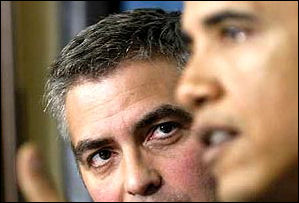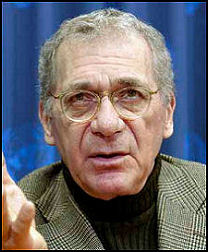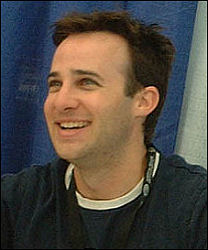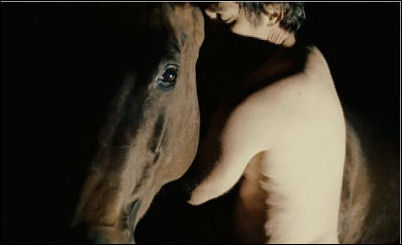Two major columns — Anne Thompson‘s in Variety and “Page Six” in the New York Post — have stuck their necks out and actually acknowledged the Robert Rodriguez-Rose McGowan dalliance during the shooting of Planet Terror (i.e., the zombie feature constituting the first half of Grindhouse), in defiance of the myopic attitude exhibited by Entertainment Weekly‘s Chris Nashawaty and the L.A. Times‘ Paul Cullum in their coverage of the Weinstein Co. release.
Month: April 2007
Clooney on Obama
“Everyone says the country isn’t ready for a black president. I think that’s ridiculous. Is he going to lose Illinois? Is he going to lose New York or California because he’s black? No. And maybe he makes some inroads into other places, and maybe, for once, he could get young people to show up and vote.” — George Clooney talking about the ’08 presidential election prospects of Sen. Barack Obama, as conveyed in an over-and-done-with (i.e., four days old) L.A. Times piece by Tina Daunt.

Clooney is right-on except for the part about Obama getting young people to “show up and vote.” More young people than usual showed up at the polls in November ’04 (they accounted for 17% of the electorate), but a much bigger percentage didn’t vote at all. Younger voters are usually more liberal and supportive of challengers and against the status quo, and therefore would have mainly voted for John Kerry.
They could have therefore denied Bush his re-election, but they didn’t. Too many of the 18-to-29 age group sat on their ass and became, as I put it the day after election, the “generation of shame.” As one MSNBC commentator remarked, “in a presidential election younger voters will always leave you at the altar.”
Google’s TiSP
I’ve been hearing about a low-cost, toilet-using broadband system being in the works since ’02 or ’03, and now it’s finally here. And installing Google’s TiSP is a “mostly sanitary” process. I meant to run this yesterday (obviously a more appropriate day than today) and I have no excuse.
Pollack’s “Recount”
The most exciting sounding film I’ve read about today, hands down, is Sydney Pollack‘s Recount, an HBO feature about the 2000 presidential election and how the George Bush forces managed to finagle things in their favor at the end of the day. With shooting beginning this spring or summer, it’ll be a character-driven film about all the squabbling, spinning, vote-disqualifying and Supreme Court deliberating that eventually handed Bush the presidency despite Al Gore winning the popular vote.


(l.) Sydney Pollack; (r.) Danny Strong
Recount will probably be seen at the beginning of the ’08 primary season, or certainly by March or April.
No stars are attached. The script (“a hot commodity when it first made the rounds”) is by Danny Strong, who is best known as an actor (Pleasantville, Seabiscuit). It will be produced by HBO Films in association with Spring Creek/Mirage Prods, with Paula Weinstein, Len Amato and Pollack exec producing. HBO Films has decided against releasing Recount via its theatrical arm Picturehouse because, execs told Variety‘s Steven Zeitchik, airing it on the pay net will guarantee millions of viewers.
HBO Films honcho Colin Callender said that Recount would focus on many of the smaller players in the drama. “It boils the story down to individuals, men and women and husbands and wives, caught up in events slightly beyond their control,” he told Variety. That doesn’t interest me. I want to see a drama about the top campaign chiefs spinning and strategizing and pulling strings in order to beat the other team.
Smith is the Shit
In the wake of Mel Gibson and Tom Cruise‘s descent into wackjob eccentricity and with Tom Hanks “no longer viable for most leading-man scripts,” Newsweek is saying that Will Smith is become the biggest Big Hollywood Kahuna of them all, followed by Johnny Depp and Ben Stiller.
The ability to sell tickets to the shmoes is certainly exciting beyond measure. When I think of all that money, and all that power that Smith has in the palm of his hand, I just go limp in the knees.
Of course, Smith is a softballer from the word “go” and hasn’t accelerated anyone’s pulse since he made Six Degrees of Separation.
And Depp is such a patented eccentric that he makes eccentricity seem mun- dane. Plus he has all that bad movie karma right now. I don’t want to sound judg- mental, but it will take Depp many years to atone for Charlie and the Chocolate Factory and the Pirates of the Caribbean movies. I’m sorry but he has to suffer for those films, and if sourpusses like me have anything to say about it, he’ll pay through the nose when Sweeney Todd comes out in December.
And Stiller…I used to love Stiller. I own that Ben Stiller Show DVD package and still watch it from time to time. As recently as Starsky and Hutch he was crackling like a sparkler. Maybe he’ll come back. Let’s leave it at that.
Binder-Hickenlooper hitbacks
Variety‘s Monica Corcoran considers the always-entertaining phenomenon of movie directors getting into scraps with anonymous online detractors. Specifically, helmers Mike Binder and George Hickenlooper jumping into Hollywood Elsewhere reader-response discussions (including some scattered dissings) of their respective films, Reign Over Me and Factory Girl.
“So it seems directors do, in fact, read their reviews,” says Corcoran. “And given the chance to bite back, some would like an opportunity to personally defend their cinematic theses face to face. Just don’t expect Internet posters to play along. After all, stripping web revelers of their masks would certainly leaden the dialogue and make cyberspace just another safe, boring Hollywood party.”
Dennis Lim meets “Zoo”
Yes, absolutely, no argument whatsoever — Robinson Devore‘s Zoo (ThinkFilm, 4.25) is, visually, a very lyrical piece of work. Sean Kirby‘s cinematography, especially when taking in the beautiful scenery in and around Enumclaw, Washington (i.e., the final home of a man who died from a perforated colon after having anal sex with a horse, which is what the film is more or less about), is undeniably captivating.

And here’s N.Y. Times writer Dennis Lim and his editors paying a respectful tribute to the fact that the film’s lyricism “is startlingly at odds with the sensational content.” And in a tidy, well-written way that makes the film’s subject matter seem almost as natural as picking peaches or playing stickball.
I’m sorry but there’s something profoundly troubling about talented filmmakers and a highly respected publication like the N.Y. TImes giving their earnest and thought- ful attention to a ridiculously perverse (the term I’m most comfortable with is “diseased”) sexual practice. This is precisely what red-state theologians deplore about liberal blue-state values — there are almost no absolute rights or wrongs, and therefore almost no sexual practice outside of the molesting of minors is considered out of bounds. Every form of wick-dipping under the sun is afforded a certain dignity.
I asked Devore at a Sundance q & a if any “zoo” types had ever looked into having sex with elephants in African game preserves (i.e., on the presumption that the larger the sexual organ, the greater the sexual pleasure for the receiving male). Devore smirked and shook his head and said, “There’s always one person who asks a question like that.”
Of course, it’s entirely within the realm of logic to ask such a question, and the fact that Devore (or perhaps Dennis Lim) would regard such a question as antagonistic and beyond-the-pale is precisely what’s wrong with the blase p.c.-attitude types who can look at perversity of a certain kind and call it a fitting subject for an unusual art film, but then turn around and draw lines and act dismissive when it comes to another, equally absurd form of perversity. Does the notion that human- animal couplings may be an affront to nature and basic decency even enter their minds?
Perhaps as they’re thinking this over, “zoo” types and their friends might want to look at the eyes of the horse in the above photo and ask themselves if they’re seeing calm or comfort, or perhaps a degree of alarm.
Oh, and by the way: Lim (or his editor) gets it wrong by saying Zoo was known during the Sundance Film Festival as “the horse-sex movie” — the coinage was a little blunter than that.
McCarthy on “Grindhouse”
Robert Rodriguez‘s Grindhouse installment, a zombie movie called Planet Terror, “wins points on the basis of sheer accuracy for more exactly replicating the hollow, soul-sucking badness of many low-grade gore films,” writes Variety‘s Todd McCarthy. “By contrast, Quentin Tarantino‘s Death Proof, a road-rage opus, so far exceeds almost anything made [in exploitation films of the late ’60s and ’70s] in terms of dialogue and performance that it seems like a different beast — one half plotless gabfest, the other half insane car chase.
“The dialogue in Death Proof‘s first section, an Iceman Cometh-like segment with Kurt Russell dispensing smoothie chit-chat to some hot ladies in an Austin bar, is “great, ” says McCarthy, “with a touch of the poet at times. Tarantino here lays a claim to being the Joseph L. Mankiewicz of trash talk, so easily does he create reams of dialogue in distinct voices and so well does he direct it.”
“Huckabees” reenactment
Late to the table, as usual (three days ago…good God!), but Paul Rudd and Michael Showalter reenacting the Lily Tomlin/David O. Russell Huckabees sceamfest is a lot funnier than I thought it would be.
Morgenstern to Bart
“I’m not an industry insider like you, but I’ll bet dollars to popcorn, Peter, that you…hear what I do from some of our most gifted filmmakers — expressions of deep concern, if not downright despair, about Hollywood’s growing hostility to creative enterprises that don’t fit the entertainment conglomerates’ increasingly rigid templates, and about the precarious plight of the independent film movement. If this is health, then spare us all from too much more of it.” — Wall Street Journal critic Joe Morgenstern to Variety editor Peter Bart about Bart’s 3.15 column — over two weeks ago! — that claimed critics are out of touch with the tastes of the mongrel hordes.
Zell owns L.A. Times
The Tribune Company and the L.A. Times have been purchased by Sam Zell, a “flamboyant” Chicago real estate tycoon with zero newspaper-managing experience who “fancies Ducati motorcycles, leather jackets [and] playing paintball,” according to an L.A. Times article by Thomas S. Mulligan and James Rainey.
Zell is a self-made billionaire, and — judging from what I’m reading here — a bit of a rube. In a 12.04 interview with the N.Y. Times, “Zell suggested that he did not have a high opinion of journalists,” according to a 4,2 piece by Katherine Q. Seelye and Andrew Ross Sorkin. “I started out as a kid thinking that reporters are out there to do good, to expose the world to the truth,” Zell is quoted as saying. “Over the years I’ve gotten a lot smarter. I’ve gotten a lot thicker skin.”
Manhattan-based entertainment journalist Lewis Beale says, “I’ve been a staff writer for three dailies — two individually owned, and one run by a chain. And I’ll take the chain ownership any day of the week. Not subject to individual whims, prejudices and bizarre peccadillos. Chains sure aren’t perfect, but they’ve definitely got the billionaire bozo-owner beat.”
“I feel really sorry for the folks at the L.A. Times and Newsday,” he adds. “They are in for some hard times.”
Bergan and monk’s robes
I smirked…no, I chortled when I read this Ronald Bergan article in the Guardian six or seven days ago — a piece that explained in some detail what a good film critic needs to have read and seen, and the terminology he/she generally needs to know. I actually found it sobering and slightly humorous. Bergan knows his stuff, and anyone looking to be a serious film critic should absolutely follow his lead. But you also have to swim in the waters as you find them.



Guardian essayist and scholarly film critic Ronald Bergan (center)
I’m saying, in part, that not knowing the difference between, say, diegetic and non-diegetic music and being unfamiliar with the writings of Siegfried Kracauer and Roland Barthes (which I am guilty of on all counts) is not going to hurt you that much in this day and age. In fact, referring to these criteria with any regularity will mark you as some kind of elitist dweeb.
By today’s degraded and debauched standards, Bergan, to go by his article, is very nearly a monk wearing brown robes and living in a country monastery and writing memos on scrolled parchment. I don’t say this with any relish; I say it because it’s almost true.
The natural proverbial environment for most of the movies released today is the colisseum, not the salon . Movies have become a mongrelized art form, and the film-snob culture that came out of the ’60s and ’70s and early ’80s is becoming more and more marginalized. It hasn’t gone away (God help us if that culture is forgotten entirely) but it has certainly withered on the vine.
If you want to respond and grapple with 21st Century movies in a way that will engage Average Joes, you have to ditch the robes and sandals, put on some jeans and boots, walk down the winding stone staircase of your ivory tower and step out into the world and deal with the elements as they come. No more going “pooh- pooh” and “tut-tut” from a sitting position with your gut hanging over your belt — you have to get down, get online, walk the walk and boogie it up.
I might have forgotten about this whole Bergan matter if I hadn’t run across Ty Burr‘s response to his article on his “Movie Nation” blog (is there a print version?) on the Boston Globe site. Burr feels more or less the same way I do, although he’s a bit more circumspect about it.
